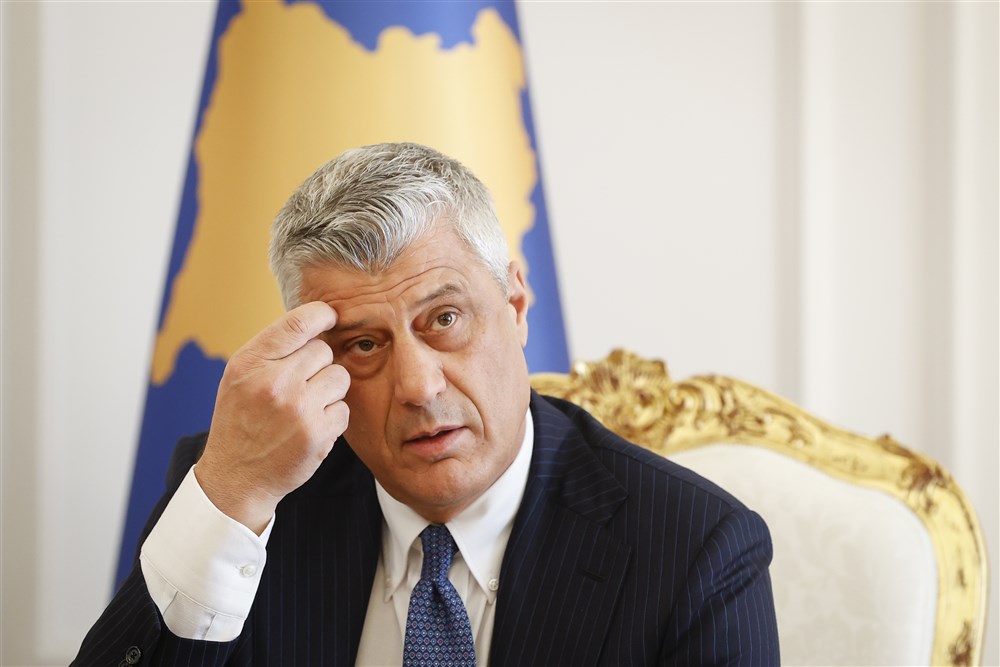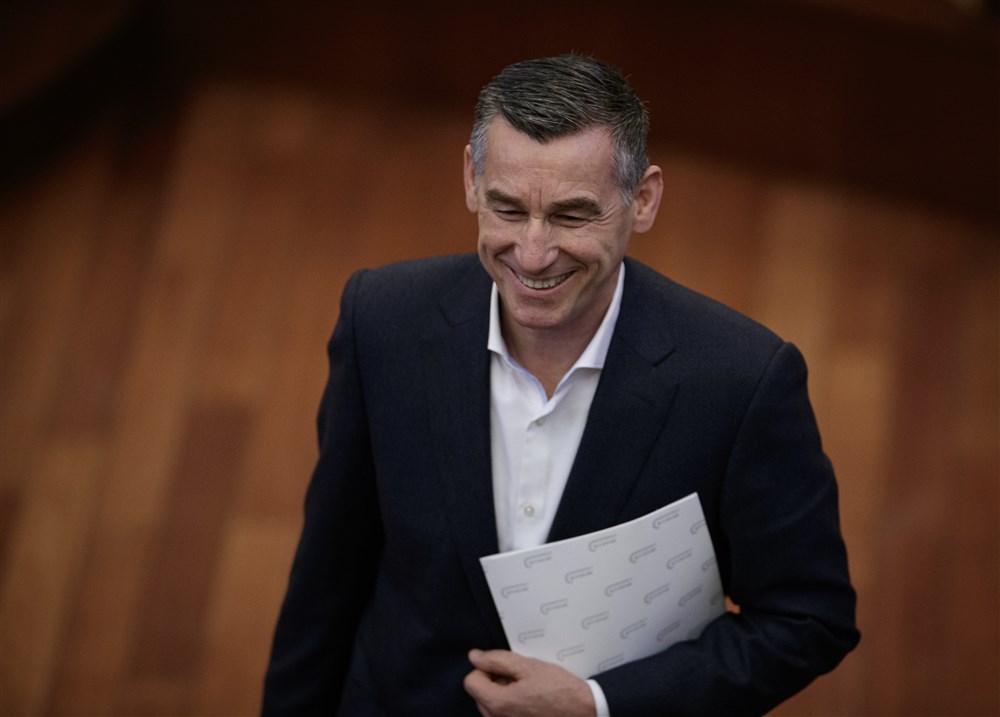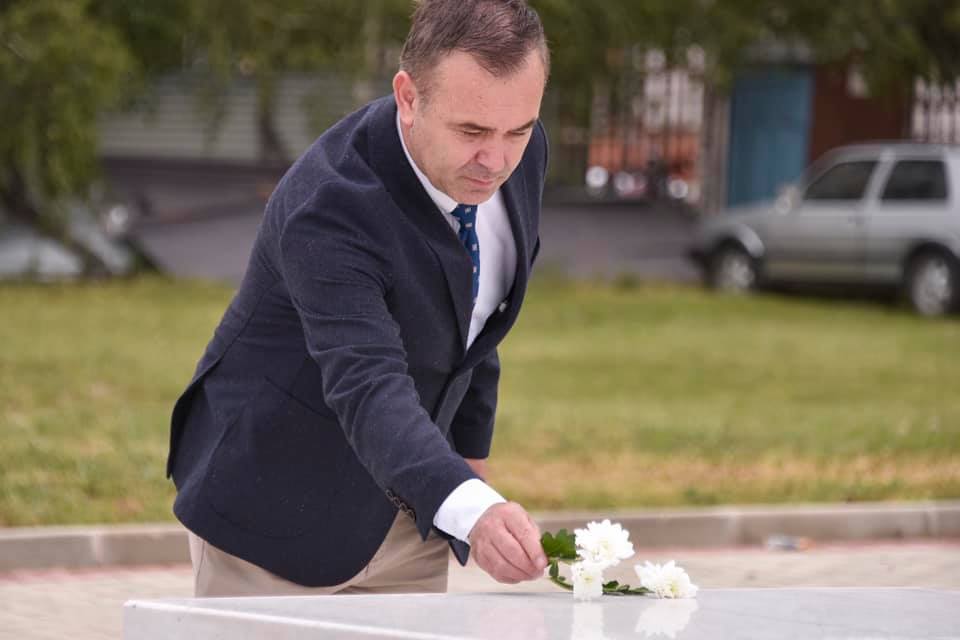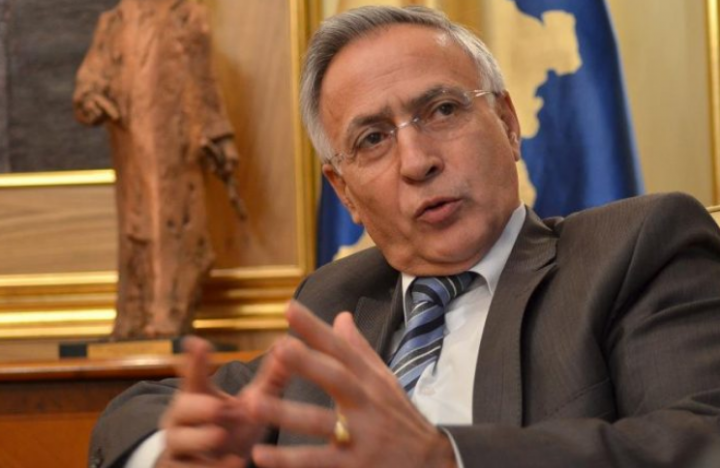Over two decades after they fought a war together as Kosovo Liberation Army guerrillas, Hashim Thaçi, Kadri Veseli, Rexhep Selimi and Jakup Krasniqi are reunited in court in The Hague to fight war crimes charges.
Back in 1998, during the early months of the Kosovo war, Hashim Thaçi, Kadri Veseli, Rexhep Selimi and Jakup Krasniqi all worked together in a small building in the remote hilltop village of Likoc/Likovac that served as the main headquarters of the guerrilla Kosovo Liberation Army, KLA.
On April 3, the four wartime leaders will be together again, this time before the prosecutors at the Kosovo Specialist Chambers in The Hague courtroom to hear the charges against them read out in the courtroom as their trial for war crimes and crimes against humanity begins.
Thaçi, Veseli, Selimi and Krasniqi, who all became senior politicians after the 1998-99 war ended, are accused of being responsible for committing a series of crimes against hundreds of civilians and non-combatants during the conflict.
They all have pleaded not guilty.

Hashim Thaçi, 2020. EPA-EFE/VALDRIN XHEMAJ
Hashim Thaçi: presidency cut short by indictment
The past 25 years since he became political director of the KLA have been an eventful time for Hashim Thaçi, 55.
Back in 1998, he was keeping in contact with diplomats from a Kosovo village while dodging the pursuit of Serbian police. Several months later, he was on a French military jet from Serbian-controlled Pristina airport on his way to a medieval castle of Rambouillet in France where, to the surprise of many, he led Kosovo’s delegation in ultimately unproductive talks with Yugoslav President Slobodan Milosevic’s representatives.
When got back to Kosovo, NATO was beginning its air strikes on Yugoslavia aimed at forcing Milosevic to end his campaign of repression, while Thaçi was putting together his provisional government for the post-war period, in which he would be prime minister, although it only had limited powers because the UN took control after Milosevic withdrew.
When the war ended in June 1999, Thaçi used a NATO helicopter to return to the KLA’s main headquarters in the Kosovo village of Berishe and never wore the guerrilla force’s uniform again. Instead, he established a political party, the Democratic Party of Kosovo, PDK (initially the Party of Democratic Progress of Kosovo), which he led until 2016 when he became president of Kosovo.
Before becoming head of state, he served as prime minister (from 2008-2014) and then simultaneously deputy prime minister and foreign minister (2015-2016) after his party won three consecutive parliamentary elections in 2007, 2010 and 2014.
On February 17, 2008, when Kosovo announced its independence, Thaçi read out the declaration, becoming one of the most important figures in the country’s history and establishing himself as the uncontested leader of the newborn state.
But while he has been a key figure for more than two decades, he has also been dogged by controversy, including allegations of crimes committed by leaders of the KLA during and immediately after the war.
In December 2010, he was hit by one of the biggest blows of his career when Council of Europe published a report that alleged he was the head of an organised crime ring that had been involved in offences including organ-trafficking towards the end of the Kosovo war.
He called the report “scandalous” and “filled with defamation and lies” and later announced he would sue the author of the report, Swiss politician Dick Marty, although this never happened.
Marty’s allegations were then investigated by an EU task force, which concluded that Thaçi and others could face war crimes charges, although it said there wasn’t enough evidence to support the organ-trafficking allegations.
A decade after Marty’s explosive allegations, in November 2020, Thaçi quit as head of state and was sent to The Hague court, since when he has been waiting for his trial in detention.
“This is not a farewell but only a goodbye,” were the last words in his resignation speech before he boarded a special plane to The Hague, and to the next stage in his eventful life.

Kadri Veseli. EPA-EFE/VALDRIN XHEMAJ
Kadri Veseli, the ‘secret leader’
When Kosovo media outlets aired a pre-recorded statement from Kadri Veseli in June 2008, the day before Kosovo’s first constitution entered into force, the public were finally able to see what the person everyone had been talking about actually looked.
Veseli had been the head of Kosovo’s shadowy intelligence service, SHIK, since it was set up in 1999. SHIK was controversial because it was not established under any legislation and it reported to no one.
The new constitution established a legal intelligence service and put an end to SHIK. But its operations remain murky and Veseli one of the few who knows exactly what it did.
He insisted however that it was never used for political ends. “SHIK’s activity was purely about security… SHIK never interfered with politics. It is an absurd innuendo because it was completely apolitical; national security was its only activity,” Veseli told BIRN in 2017.
Veseli officially went into politics in November 2012 when he became deputy head of Hashim Thaçi’s PDK party.
In 2014, in the first elections when he was on the candidates list, he won a seat as an MP seat and was then elected head of parliament.
Later he replaced party founder Thaçi as leader of the PDK after Thaçi became president of Kosovo in 2014 and served as speaker of parliament.
His swift political rise did not surprise most ordinary people in Kosovo, who attribute it to the power he obtained while running the intelligence organisation – and to his close friendship with Thaçi.
In his first speech as PDK chief in May 2016, Veseli admitted that problems had accumulated in Kosovo during the rule of his party – a period when the country was criticised internationally for corruption and bad governance.
Veseli was born in Mitrovica in 1967 into a family of political activists – two of his older brothers and a cousin were arrested by the Yugoslav authorities in 1981 – and Veseli also became an activist while studying at the University of Pristina in 1986-87.
There, he joined the People’s Movement of Kosovo, LPK, an underground Kosovo Albanian Marxist-Leninist organization, founded in 1982, with the aim of advancing Kosovo’s status from an autonomous province of Serbia and Yugoslavia into a fully-fledged Yugoslav republic.

Rexhep Selimi, 2020. Photo: Rexhep Selimi courtesy.
Rexhep Selimi, an artist among guerrillas
In November 2022, the Kosovo Museum staged an exhibition of paintings, some of which came from the detention centre in The Hague.
The artist behind these works from behind bars was, Rexhep Selimi, 52, the third war crime defendant in the KLA leaders’ trial.
“His art can’t be stopped by the place he is in and the time he is going through,” his wife, Shqipe Selimi, now an MP with ruling party Vetevendosje, said at the launch of the exhibition.
It was Selimi who made the first public appearance by a KLA member, alongside two others, all of them masked, in November 1997 at a funeral of a teacher who was killed by Serb forcesin the village of Llaushe in the Skenderaj/Srbica area.
As one of the KLA’s founders, Selimi was on the KLA’s General Staff during the 1998-99 armed resistance and was Hashim Thaci’s pick for interior minister in Kosovo’s Provisional Government, which was established after the February 1999 Rambouillet talks.
After the war in 2000, Selimi became commander of the Training and Doctrine Centre with the Kosovo Protection Corps, a civil emergency body formed after the disarmament of the KLA.
But his military career took a blow in 2001 when his name was put on a blacklist by the US administration of then President George W. Bush. Selimi was sanctioned alongside various others who were connected to the armed conflict between ethnic Albanian rebels and the security forces in North Macedonia that year. Bush’s executive order said the US was targeting individuals who “threaten international stabilisation efforts in the Western Balkans”.
In 2005, Selimi joined Ramush Haradinaj’s Alliance for the Future of Kosovo, AAK party, but five years later he switched allegiances to Albin Kurti’s Vetevendosje. He was elected as a Vetevendosje MP and later became head of its parliamentary group of lawmakers.

Jakup Krasniqi.
Jakup Krasniqi, history teacher and activist
Jakup Krasniqi, now 72, made headlines in spring 1999 when he appeared in public for the first time as the KLA’s spokesperson, in a dark room accompanied by two armed and uniformed fighters standing behind him.
A historian by profession, Krasniqi spent the early part of his career as a history teacher in in his village’s elementary school in Negrovc and then as a professor at a secondary school in Drenas/Glogovac.
An activist since his youth, he was arrested in 1981 for his political activities against communist Yugoslavia and served ten years in prison. After his release in 1991, he became part of Ibrahim Rugova’s Democratic League of Kosovo, LDK political party until the KLA took over his region of Drenica in 1998.
He was part of the Kosovo delegation at the Rambouillet talks, and after the war he joined Thaci’s PDK, serving for more than a decade as the party’s secretary-general.
In 2008, he was elected parliamentary speaker, a post he kept until 2014 when he parted ways with Thaci and formed his own party, Nisma (Initiative) together with his former KLA comrade-in-arms Fatmir Limaj. By the time Krasniqi was arrested, he was already retired.
“I am an intellectual, I am a person who fought Serbia through political means and never pointed a finger at the civilian population, be it Serb or any other ethnicity,” Krasniqi told the court emotionally on November 9, 2020, the day he appeared at the Specialist Chambers for the first time after being sent to The Hague.





